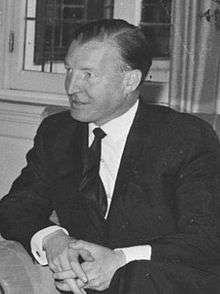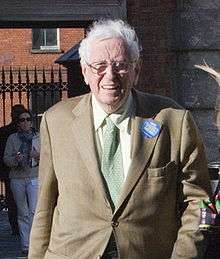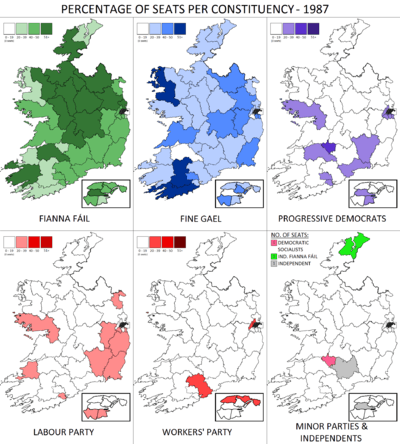Irish general election, 1987
| | |||||||||||||||||||||||||||||||||||||||||||||||||||||||||||||||||||||||||||||||||||||||||||||||||||||||||||||||||||||||||||
| |||||||||||||||||||||||||||||||||||||||||||||||||||||||||||||||||||||||||||||||||||||||||||||||||||||||||||||||||||||||||||
| |||||||||||||||||||||||||||||||||||||||||||||||||||||||||||||||||||||||||||||||||||||||||||||||||||||||||||||||||||||||||||
|
| |||||||||||||||||||||||||||||||||||||||||||||||||||||||||||||||||||||||||||||||||||||||||||||||||||||||||||||||||||||||||||
| Percentage of seats gained by each of the five biggest parties, and number of seats gained by smaller parties and independents. | |||||||||||||||||||||||||||||||||||||||||||||||||||||||||||||||||||||||||||||||||||||||||||||||||||||||||||||||||||||||||||
| |||||||||||||||||||||||||||||||||||||||||||||||||||||||||||||||||||||||||||||||||||||||||||||||||||||||||||||||||||||||||||
The Irish general election of 1987 was held on 17 February 1987, four weeks after the dissolution of the Dáil on 20 January. The newly elected 166 members of the 25th Dáil assembled at Leinster House on 10 March when a new Taoiseach and a Fianna Fáil minority government were appointed.
The general election took place in 41 parliamentary constituencies throughout Ireland for 166 seats in the lower house of parliament, Dáil Éireann.
Campaign
The general election of 1987 was precipitated by the withdrawal of the Labour Party from the Fine Gael-led government on 20 January 1987. The reason was a disagreement over budget proposals. Rather than press on with the government's agenda, the Taoiseach and leader of Fine Gael, Garret FitzGerald, decided to dissolve the Dáil. An unusually long period of four weeks was set for the campaign. It was hoped that the electorate would warm to Fine Gael's budget proposals during the campaign.
Fianna Fáil's campaign involved a refusal to make any definite commitments; however they attempted to convince the electorate that the country would be better under Fianna Fáil. Charles Haughey's attitude towards Northern Ireland and the Anglo-Irish Agreement were both attacked. However, the campaign was mostly fought on economic issues.
The Labour Party decided against any pre-election pact, particularly with Fine Gael. The Progressive Democrats, founded only two years earlier, surpassed the Labour Party as the third-biggest political party in the Dáil. Although the majority of the party consisted of Fianna Fáil defectors, it mainly took seats from Fine Gael.
Results
| Party | Leader | Seats | ± | % of seats |
First Pref votes |
% FPv | ±% | |
|---|---|---|---|---|---|---|---|---|
| Fianna Fáil | Charles Haughey | 81 | 48.8 | 784,547 | 44.1 | |||
| Fine Gael | Garret FitzGerald | 51 | 30.1 | 481,127 | 27.1 | |||
| Progressive Democrats | Desmond O'Malley | 14 | New† | 8.4 | 210,583 | 11.8 | – | |
| Labour Party | Dick Spring | 12 | 7.2 | 114,551 | 6.4 | |||
| Workers' Party | Tomás Mac Giolla | 4 | 2.4 | 67,273 | 3.8 | |||
| Sinn Féin | Gerry Adams | 0 | New | 0 | 32,933 | 1.9 | – | |
| Democratic Socialist Party | Jim Kemmy | 1 | 0.6 | 7,424 | 0.4 | 0 | ||
| Green Alliance | None | 0 | 0 | 7,159 | 0.4 | |||
| Communist Party | Eugene McCartan | 0 | 0 | 725 | 0.0 | 0 | ||
| Independent | N/A | 3 | 1.8 | 70,843 | 4.0 | |||
| Spoilt votes | 16,241 | — | — | |||||
| Total | 166 | 0 | 100 | 1,793,406 | 100 | — | ||
| Electorate/Turnout | 2,445,515 | 73.3% | — | |||||
Independents include Independent Fianna Fáil (7,720 votes, 1 seat) and the Tax Reform League (3,832 votes).
- Fianna Fáil minority government formed.
- Notes:
- Changes in numbers of seats for each party are shown relative to the previous election in November 1982.
- †During the previous Dáil, 4 Fianna Fáil TDs and 1 Fine Gael TD had joined the Progressive Democrats.
In spite of the opinion polls suggesting otherwise, Fianna Fáil once again failed to win an overall majority. However the party was able to govern as a minority government and Charles Haughey was back for his third and final time as Taoiseach. The Fianna Fáil government of 1987 to 1989 was the last time to date that a government composed of only one party has been formed in Ireland. The new party, the Progressive Democrats (PDs), did exceptionally well on their first outing, becoming the third biggest party in the Dáil. Fine Gael lost many seats, mostly to the PDs. The Labour Party failed to make any impact, with its leader Dick Spring, almost losing his seat.
Dáil membership changes
The following changes took place as a result of the election:
- 17 outgoing TDs retired
- 1 vacant seat at election time
- 147 outgoing TDs stood for re-election (also Tom Fitzpatrick, the outgoing Ceann Comhairle who was automatically returned)
- 127 of those were re-elected
- 20 failed to be re-elected
- 38 successor TDs were elected
- 32 were elected for the first time
- 6 had previously been TDs
- There were 6 successor female TDs, with the total remaining unchanged at 14
- There were changes in 32 of the 41 constituencies contested
Where more than one change took place in a constituency the concept of successor is an approximation for presentation only.
See also
References
- ↑ "25th Dáil 1987 General Election". ElectionsIreland.org. Retrieved 11 July 2009.
- ↑ "Dáil elections since 1918". ARK Northern Ireland. Retrieved 11 July 2009.
- ↑ Nohlen, Dieter; Stöver, Philip (2010). Elections in Europe: A Data Handbook. Nomos Verlagsgesellschaft Mbh & Company. ISBN 978-3-8329-5609-7.
- ↑ Cathal Coughlan died in 1986 but no by-election was held.
External links
- 1987 election: Party leaders' debate RTÉ archives [dead link]





